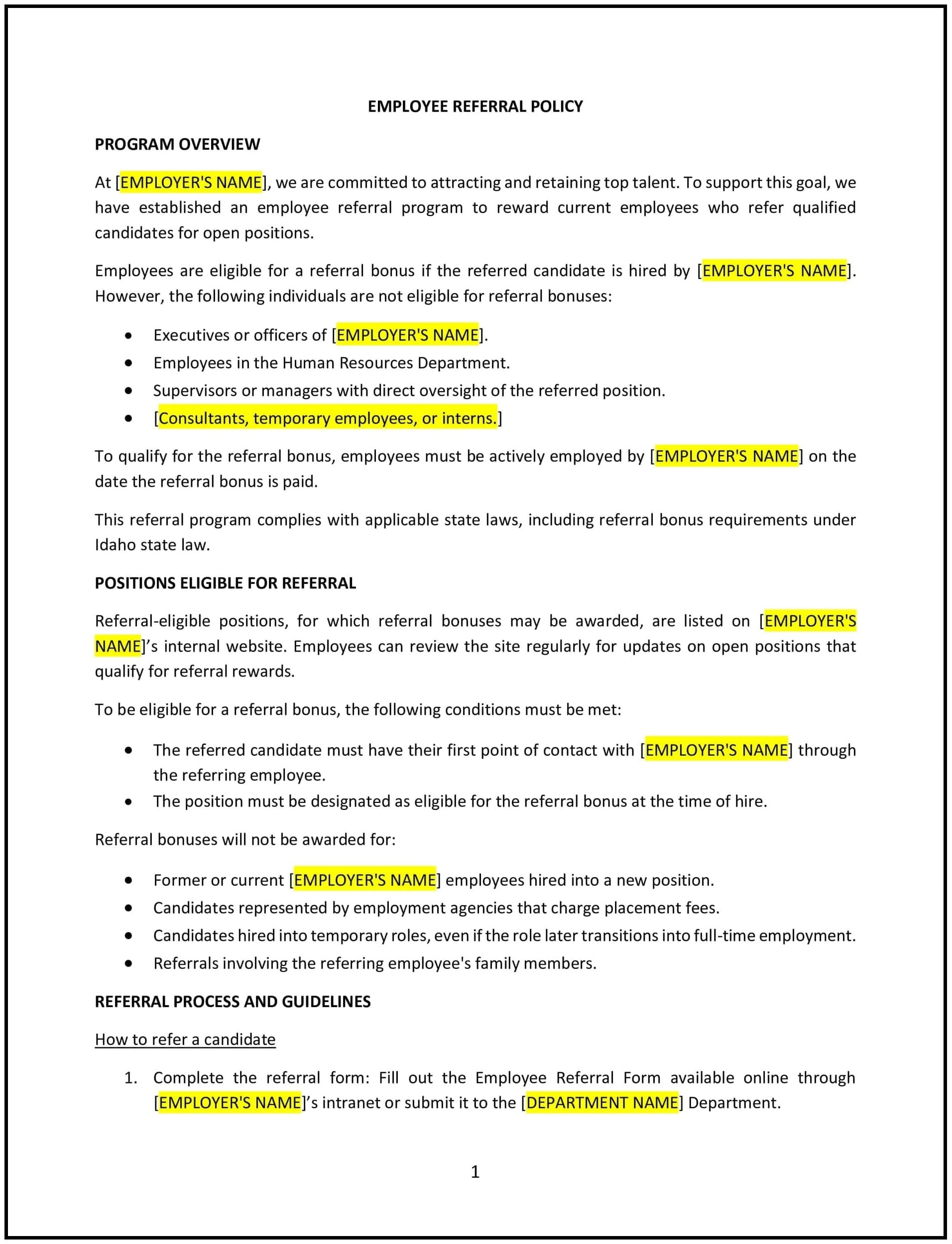Got contracts to review? While you're here for policies, let Cobrief make contract review effortless—start your free review now.

Customize this template for free
Employee referral policy (Idaho)
An employee referral policy helps Idaho businesses establish guidelines for employees to refer qualified candidates for open positions within the organization. This policy outlines the referral process, eligibility criteria, and incentives for successful hires. It reflects the business’s commitment to leveraging its workforce to attract top talent and streamline recruitment efforts.
By implementing this policy, businesses can enhance their hiring process, improve employee engagement, and build a stronger workforce.
How to use this employee referral policy (Idaho)
- Define referral process: Specify the steps employees should follow to refer candidates, such as submitting resumes or completing referral forms.
- Outline eligibility criteria: Provide guidelines for who can participate in the referral program, such as full-time employees or those in good standing.
- Set incentives: Describe the rewards for successful referrals, such as cash bonuses, gift cards, or additional paid time off.
- Communicate expectations: Ensure employees understand the policy, including the types of positions eligible for referrals and the timeline for incentives.
- Track referrals: Maintain records of employee referrals, including the status of candidates and outcomes of the hiring process.
- Train managers: Equip supervisors with the knowledge to manage the referral program and address employee questions or concerns.
- Review and update: Regularly review the policy to ensure it remains aligned with business needs, employee expectations, and Idaho laws.
Benefits of using this employee referral policy (Idaho)
This policy provides numerous benefits for Idaho businesses:
- Attracts top talent: Employee referrals often result in high-quality candidates who are a good cultural fit for the organization.
- Reduces recruitment costs: Leveraging employee networks can lower the costs associated with external recruitment efforts.
- Improves employee engagement: Encouraging employees to participate in the referral program fosters a sense of ownership and involvement in the company’s success.
- Speeds up hiring: Referred candidates often move through the hiring process more quickly, reducing time-to-fill for open positions.
- Enhances retention: Referred employees tend to stay with the company longer, as they are often well-matched to the role and culture.
- Builds trust: A transparent and fair referral program demonstrates the business’s commitment to employee involvement and recognition.
- Aligns with best practices: The policy reflects modern recruitment strategies and can enhance the business’s reputation among job seekers.
Tips for using this employee referral policy (Idaho)
- Communicate the policy effectively: Share the policy with employees during onboarding, training sessions, and through internal communications to ensure awareness.
- Promote the program: Highlight the benefits of the referral program and encourage employees to participate through posters, emails, or team meetings.
- Simplify the process: Make it easy for employees to refer candidates by providing clear instructions and user-friendly referral forms.
- Recognize contributions: Publicly acknowledge employees who make successful referrals to encourage participation and build morale.
- Monitor results: Track the success of the referral program, including the number of referrals, hires, and retention rates, to assess its effectiveness.
- Review the policy regularly: Update the policy as needed to reflect changes in business needs, employee expectations, or Idaho laws.
- Lead by example: Encourage leadership to participate in the referral program and model a commitment to attracting top talent.